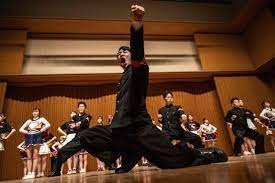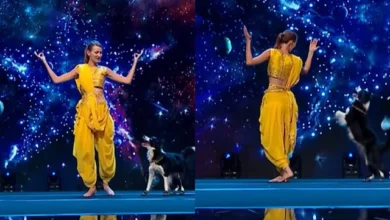Macho Cheerleaders in Japan Fight to Preserve a Tradition
Meet Japan’s mostly male and openly macho “leadership section” cheerleaders. They are soaked in perspiration, have bloodied hands from clapping, and have hoarse voices from screaming. Since fewer students are exhibiting interest in the extreme style of art, some believe that the cheerleaders’ century-old heritage is in danger of dying out.
There is now a drive to register the teams together with their Japanese “oendan” counterparts as a part of the nation’s “intangible” cultural heritage.
The cheerleaders from the “leadership section” are intimidating. At college baseball games, they are a mass of black wearing outdated school uniforms, belching slogans, beating taiko drums, and making hard, martial movements with their fists.
Taisuke Ono, a 21-year-old athlete from Tokyo’s Waseda University, said that the reason people find his team so cool is because “we give it our all to the point of ridiculousness.”
“Even when there is little chance of a comeback and we are down by ten points, we somehow manage to convince ourselves that we can win.”
Teams like Ono’s often perform with brass bands and mostly female American-style cheerleaders, a trio known as “oendan” or “rooters”.
One investigation, however, found that the male-dominated “leadership sections” had witnessed a far faster rate of decline than their female counterparts, with around a dozen groups becoming extinct in the last 15 years.
Shouting prohibitions and crowd control measures during the pandemic simply made the situation worse.
Numerous institutions banded together last year in an effort to obtain the tradition’s certification as a “intangible cultural property” as a result of the alarming situation.
The badge is given by Japan’s culture minister to pursuits deemed to be of special significance, such as traditional sake brewing and calligraphy.
While previous winners of the distinction have received government funding, campaigners claim that recognition would boost the teams’ status and inspire new members.
“Emperor,” “slaves,” and
According to Jun Tochimoto, the campaign’s driving force, “the culture is about to disappear at this point.”
“We hope that mindset will be preserved,” he added. “At the core of what these cheerleaders do is the idea that they’re training and improving themselves through the art of cheering.”
Potential recruits were frightened off by macho images and rumors of hazing some decades ago, which marked the beginning of the slide.
The squads, a vestige from Japan’s counterculture during the Meiji era (1868–1912), are said to have been given a military aesthetic by demobilized students.
According to Hiroshi Imazu, a 1970 alumnus of Tokyo’s Chuo University, a brutal hierarchy predominated in the post-war years, with senior-year students being worshipped as the “emperor” and freshmen being treated roughly as “slaves.”
The former squad member stated that they were sometimes entrusted with combating left-wing students whose agitation had rendered several campuses inoperable.
The 76-year-old recalled: “We were simply a group of undergraduates who felt pleased that the prestige of our institution was on our shoulders.
The swaggering cheerleaders from competing institutions sometimes engaged in full-fledged confrontations because of their school pride.
An alumni group’s study from 2018 said that these prior behaviors have contributed to ongoing “negative perceptions” about the squads.
However, most colleges no longer tolerate such aggression, and in recent years, a revolution that many previously believed unthinkable has taken place: women are now recruiting.
Today, women who wear the black “gakuran” uniforms perform with their male comrades, sometimes serving as group leaders.
Kazuha Nagahara, a 22-year-old student at Tokai University, told AFP that she “didn’t want to blindly accept social expectations about how women should live… and I wanted to see how far I could go in this male-centric community.”
“Anyone can become a star.”
She said that women are “breathing new life” into faltering squads.
“I believe it’s giving them a way to survive,”
Although violence is no longer permitted, asceticism and fortitude continue to be important virtues for the organizations.
Junior cheerleaders from Tokyo’s Meiji University practice their claps for so long that their hands might get bled on the palms.
Seniors who are severe but who smile and bow when speaking to spectators and visitors oversee training while staring down at their comrades and shouting and haranguing them.
The groups are inspired by the motto “annihilate yourself, serve others,” according to Yasunori Sugaya, a 50-year-old former member of the Meiji team who is now their coach.
It is a value that Motomichi Tanaka, a 21-year-old captain of the Meiji, and his peers have inherited.
He remained at attention during a rain delay that delayed play at a recent baseball game, encouraging the crowd to remain positive.
A grinning Tanaka said, “I do sometimes daydream of living a more enjoyable, relaxed university life.
Contrary to other sports, where physical prowess and innate skill play a significant role, “anyone who wants to do their best and be cool can be us,” he stated.
“Anyone can become a star… I take pride in what I do.







